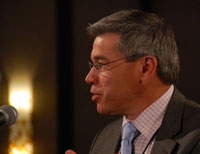 No forum on world food security issues would be complete without a session on climate change and that was how the World Ag Congress concluded its roundtable discussions Wednesday.
No forum on world food security issues would be complete without a session on climate change and that was how the World Ag Congress concluded its roundtable discussions Wednesday.
While the issue may be debatable, there is no question that agriculture should be taking every opportunity to decrease greenhouse gas emissions – including carbon dioxide, methane and nitrous oxide. Panalist Jerry Hatfield with USDA’s National Soil Tilth Laboratory talked about how nitrogen stabilizers can make a major difference in nitrous oxide emitted from the application of nitrogen fertilizer. “Nitrous oxide is 320 times more powerful than CO2, so one molecule of nitrous oxide saved is like saving 320 carbon dioxide,” Jerry said. “So we can have a major impact on total greenhouse gas emissions by reducing nitrous oxide.”
Jerry told me that USDA-ARS has found that the use of stabilized nitrogen not only reduces emissions of nitrous oxide, but it is also better for plants because it makes nitrogen more available later in the season when the plant really needs it. “So, its a win-win – a win for the plant and a win for the environment simultaneously,” he said.
He says nitrogen stabilizers are readily available in various forms for farmers from companies like Dow and AGROTAIN.
You can listen to my interview with Jerry here: waf-09-hatfield.mp3
Download the interview here: Jerry Hatfield
Flickr Photo Album for World Ag Forum
AgWired coverage of the 2009 World Agricultural Forum World Congress is sponsored by:
 .
.
